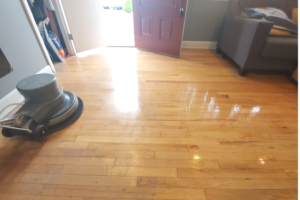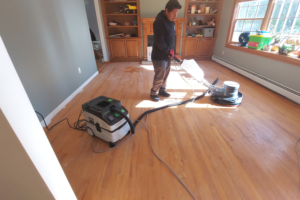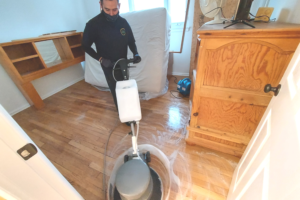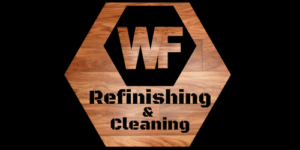Solid Hardwood Floor vs. Engineered Hardwood
How to Maintain and the Importance of Professional Hardwood Floor Cleaning
When it comes to choosing the right flooring option for your home, hardwood floors have always been a popular choice due to their timeless appeal and durability. However, with the introduction of engineered hardwood, homeowners now have another option to consider. In this article, we will explore the differences between solid hardwood and engineered hardwood, discuss the best practices for maintaining hardwood floors, and highlight why hiring a professional for hardwood floor cleaning is crucial.
Solid hardwood flooring
is made entirely from real wood and is milled from a single piece of timber. This type of flooring offers unmatched elegance and natural beauty, as each plank showcases the unique grain patterns and colors of the wood species. Solid hardwood floors can be refinished multiple times, allowing you to refresh their appearance and extend their lifespan.
Engineered hardwood
On the other hand, engineered hardwood is composed of multiple layers. The top layer, known as the wear layer, is made of real hardwood, while the lower layers are constructed from high-quality plywood or fiberboard. Engineered hardwood is designed to withstand changes in temperature and humidity, making it more resistant to warping and expanding than solid hardwood. This feature makes engineered hardwood a suitable option for areas with fluctuating moisture levels, such as basements or kitchens.
Solid hardwood & engineered hardwood maintenance
Both solid hardwood and engineered hardwood require regular maintenance to preserve their beauty and prolong their lifespan. Here are some key tips for hardwood floor cleaning and maintenance:
- Sweeping and Vacuuming: Regularly remove loose dirt and dust by sweeping or using a soft-bristle vacuum attachment. Avoid using vacuums with rotating brushes, as they can scratch the surface of the floor.
- Damp Mopping: Use a slightly damp mop or microfiber cloth to clean the floor. Avoid excessive water, as it can damage the wood. Instead, opt for a hardwood floor cleaner recommended by the manufacturer or a mixture of mild dish soap and water.
- Wipe Spills Immediately: Promptly clean up any spills to prevent liquid from seeping into the wood and causing damage or staining. Use a clean, dry cloth to absorb the liquid and then follow up with a gentle cleaning solution if necessary.
- Avoid Harsh Chemicals: Steer clear of harsh cleaning products, such as ammonia or bleach, as they can strip the floor’s finish and cause discoloration. Stick to products specifically formulated for hardwood floors.
- Protect from Furniture Scratches: Place protective felt pads or coasters under furniture legs to prevent scratches when moving or rearranging items. Avoid dragging heavy furniture across the floor.
Why hiring a professional for hardwood floor cleaning?
While regular maintenance is essential, periodically hiring a professional for hardwood floor cleaning is highly recommended. Here’s why:
- Expertise and Experience: Professional cleaners specialize in hardwood floor care and possess the knowledge and experience to handle different types of wood and finishes. They can identify the specific cleaning requirements for your floor and apply appropriate techniques and products.
- Advanced Equipment: Professionals use specialized equipment that can deep clean and extract dirt and grime from the floor’s surface and crevices effectively. This ensures a thorough and efficient cleaning process.
- Damage Prevention: Improper cleaning techniques or the use of harsh chemicals can lead to irreversible damage to your hardwood floors. Professionals are trained to avoid such mistakes and use gentle, yet effective, cleaning methods.
- Time and Convenience: Cleaning hardwood floors can be time-consuming and labor-intensive. By hiring a professional, you can save valuable time and enjoy the convenience of having experts take care of the cleaning process.
In conclusion, whether you choose solid hardwood or engineered hardwood for your home, regular maintenance is crucial to preserve their beauty and longevity. Remember to follow the recommended cleaning practices, such as sweeping, damp mopping, and wiping spills promptly. Additionally, consider hiring a professional hardwood floor cleaning service to benefit from their expertise, specialized equipment, and time-saving convenience. By investing in professional cleaning, you can ensure that your hardwood floors remain stunning and well-maintained for years to come.
General Questions
How expensive is Clean & Recoat?
Prices will vary but typically a contractor will charge you less than what they would charge you for sanding and refinishing the floor. Pricing will depend on how much time they spend cleaning a floor, the type of finish they use and the number of applications of finish they make. Get several estimates but pay careful attention to how long they will take, how they will prep the surface and the type of finish they will use.
Is this a dusty, smelly process?
The smell of the chemicals used to clean the floors is comparable to typical household cleaners and are not toxic or hazardous. The buffers we use have dust containment systems attached to vacuums to minimize any dust from prep work. We only work with waterborne urethanes that have no offensive odors. Done correctly, Clean & Recoat is the least invasive recoating process on the market today.
How log will a Clean & Recoat last?
With proper care and maintenance and by following a common sense approach to reduce wear and damage, a floor that’s been recoated can give you years of excellent service. I’ve seen floors that I recoated more than ten years ago that are still in very good shape. Most floors that are being recoated will be getting a waterborne finish and these finishes are very good and easily maintained.
What is Laminate Flooring?
Laminate flooring is a tongue and groove interlocking flooring system that comes in either planks or squares. All of these floors have a wear layer, a decorative print film layer, an inner core structure, and some type of backing support layer — usually melamine. The print film layer is either fused or glued to the inner core. The print film can be a photo of any real floor. The earlayer is applied to the decorative print layer to protect the pattern. Melamine resins are the main component of the wearlayer. The melamine surface gets its incredible durability from aluminum oxide. Aluminum oxide is almost as hard as diamonds and provides unsurpassed wear and stain resistance.
What is Engineered Flooring?
Engineered flooring is produced by bonding three or more layers of wood. The crossing of grain direction within the boards makes this a very dimensionally stable product able to resist nearly all expansion and shrinkage from normal moisture changes. This is one primary feature that makes it suitable for use directly on concrete and below-grade application.
Will my floor age or change color?
Yes. You can expect to see shade differences in your floor over time. The cause is usually from exposure to the ultra-violet rays of the sun, whether direct or indirect. This color change will be more noticeable in lighter colors, which will darken over time. In addition, certain species like Brazilian cherry, will naturally darken over the years. These changes are due to the natural characteristics of wood and are not covered by most manufacturers’ warranties.
What is Custom Finishing?
Sanding and refinishing performed to individual specifications. Custom finishing of wood floors is performed in the home on the completely installed new floor, or to refurbish a previously finished floor. Custom finishing permits the owner to select from a full range of stains, sheens and colors.
Residential Wood Floor Cleaning
Commercial Wood Floor Cleaning





